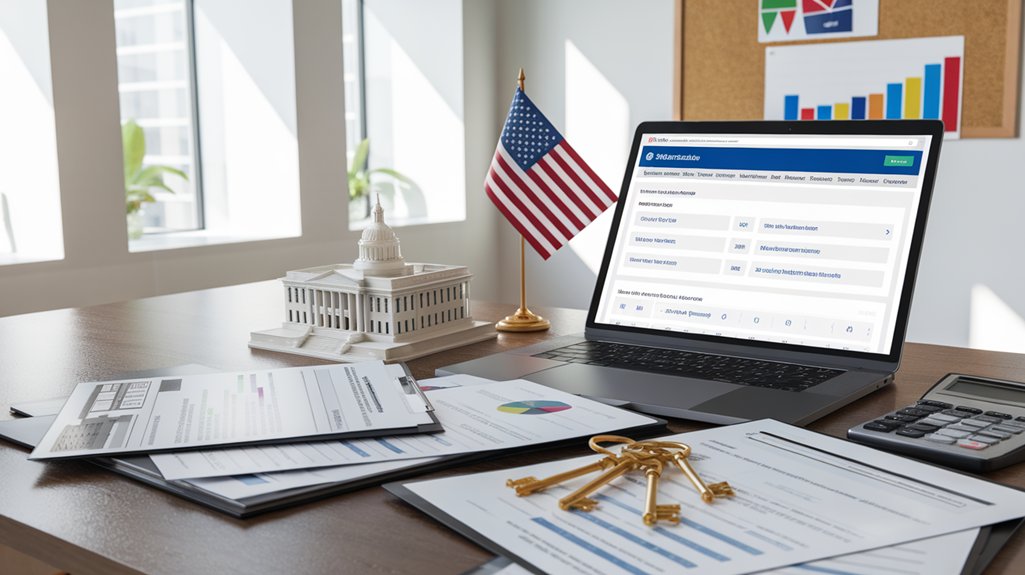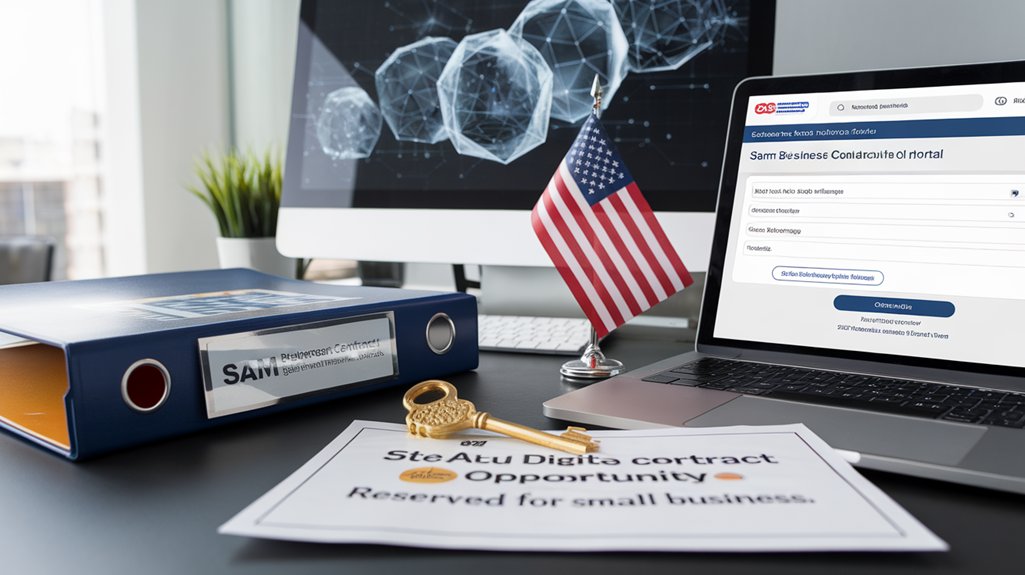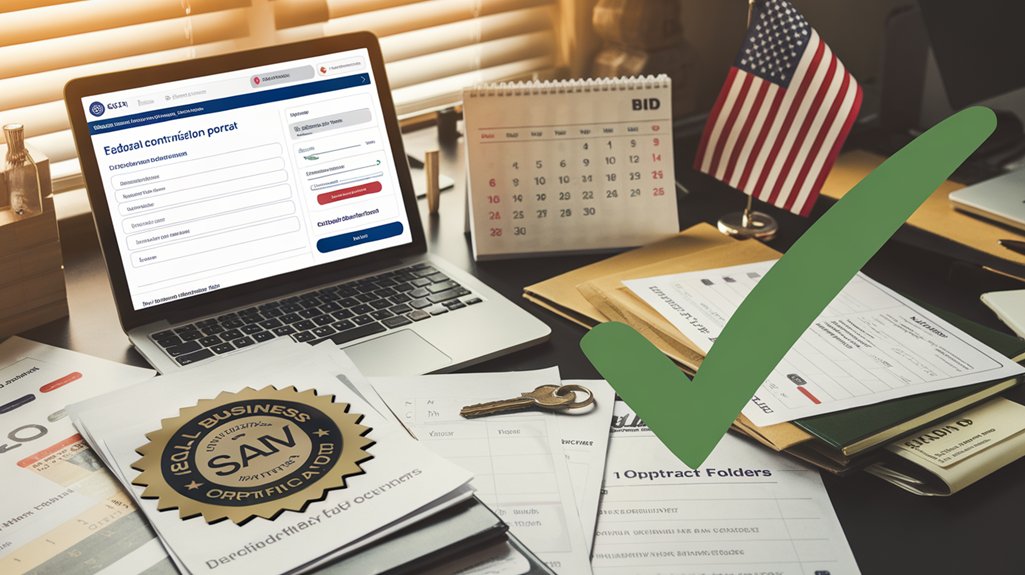SAM registration is mandatory for small businesses seeking federal set-aside contracts. Through SAM, businesses receive a Unique Entity ID, establish eligibility for specialized programs like 8(a), HUBZone, WOSB, and SDVOSB, and gain visibility to contracting officers. The system verifies business size standards against NAICS codes, ensuring qualification for set-asides under the “Rule of Two.” Proper registration with accurate NAICS codes and business descriptions greatly increases opportunities to compete for billions in reserved federal contracts.
Understanding the Small Business Set-Aside Programs

When small businesses seek government contracts, they must understand the Small Business Set-Aside Programs established under Federal Acquisition Regulation (FAR) Subpart 19.5. These programs reserve certain federal contracts exclusively for small business participation, ensuring fair market access and promoting economic growth through targeted opportunities.
Small Business Set-Aside Programs create pathways for smaller enterprises to compete for federal contracts by reserving exclusive market opportunities.
Set aside eligibility is determined primarily through industry-specific NAICS codes, which establish size standards based on revenue or employee count. The “Rule of Two” is a fundamental program requirement, mandating that contracts must be set aside when at least two qualified small businesses can reasonably compete.
Contracting officers must prioritize set-asides before opening competition to larger businesses. Small businesses seeking these opportunities must self-certify their eligibility in SAM.gov and maintain compliance with limitations on subcontracting requirements. These programs were established by Congress to support and enhance small business participation in federal contracting. Registration in the System for Award Management is mandatory for businesses to qualify for set-aside contracts.
Different types of set-asides exist, including total set-asides, partial set-asides, and specialized programs for disadvantaged businesses like HUBZone, 8(a), WOSB, and SDVOSB. Maintaining an active status in SAM demonstrates vendor legitimacy and financial stability, which are critical factors agencies consider when awarding set-aside contracts.
Benefits of SAM Registration for Small Business Contractors

Registering in the System for Award Management (SAM) provides small businesses with essential access to the federal marketplace, serving as the gateway to billions of dollars in government contracting opportunities. This mandatory registration process assigns a Unique Entity ID that creates contractor visibility across all federal agencies, both civilian and military.
SAM registration delivers several critical advantages for small businesses. It enables application for specialized certifications like 8(a), HUBZone, and WOSB programs, granting eligibility for sole-source contracts.
The system integrates with electronic invoicing platforms, supporting automated payment processing and maintaining efficient cash flow.
Additional SAM benefits include qualification for set-aside contracts specifically reserved for small businesses, enhanced visibility to prime contractors seeking subcontractors, and access to mentor-protégé programs.
Registration also mitigates compliance risks by maintaining current business representations and centralizing updates for banking, tax, and ownership information.
With proper SAM registration, businesses can leverage federal marketplace resources to navigate the registration process effectively and increase their competitive advantage.
Steps to Leverage Your SAM Registration for Government Contracts

Now that small businesses understand the advantages of SAM registration, successful contractors must take specific steps to maximize this powerful platform’s potential. SAM Optimization begins with ensuring profile accuracy and completeness, using industry-specific keywords that align with government procurement needs.
To maintain Contract Eligibility, businesses should:
- Update their SAM profile annually with current certifications and capabilities
- Properly identify eligible small business designations (woman-owned, veteran-owned)
- Monitor set-aside opportunities specifically reserved for small businesses
- Connect SAM registration with other government procurement systems like FPDS
Small businesses should also develop detailed business descriptions highlighting specialized expertise and past performance. Compliance with cybersecurity requirements is essential for businesses seeking government contracts in sensitive sectors. Inaccurate or incomplete information in your SAM profile can lead to registration delays or even rejection of your application.
Utilizing the search functionality within SAM helps identify relevant contracting opportunities that match the company’s capabilities. The centralized database system simplifies the bidding process by streamlining registration and compliance requirements for small businesses. For maximum visibility, contractors should verify that their CAGE code, UEI, and NAICS codes accurately reflect their business operations.
Frequently Asked Questions
Does SAM Registration Guarantee Qualification for All Set-Aside Programs?
SAM registration does not guarantee qualification for all set-aside programs.
While registration provides foundational contracting benefits, set-aside eligibility requires program-specific certifications beyond SAM.
Companies must separately obtain SBA certifications for programs like 8(a), HUBZone, or WOSB.
Registration serves as a prerequisite for federal contracting, but businesses must meet additional ownership, size, and socioeconomic criteria for each set-aside category.
Contractors should view SAM as the first step in a multi-stage qualification process.
How Often Must Businesses Renew Their SAM Registration?
Businesses must renew their SAM registration annually, exactly 365 days from the initial registration or previous renewal date.
The renewal frequency is fixed to the original approval date, not a calendar year. The registration process requires manual updates, as the system does not offer auto-renewal capabilities.
Companies should initiate renewals 2-3 months before expiration to accommodate federal processing times and prevent potential disruptions to bidding eligibility, contract awards, and payment processing capabilities.
Can Foreign-Owned Small Businesses Qualify for Set-Aside Contracts?
Foreign-owned small businesses face significant eligibility criteria challenges for set-aside contracts.
While foreign ownership itself doesn’t automatically disqualify a business, entities must have principal operations in the U.S. and meet standard SBA size requirements.
Foreign ownership implications include mandatory NCAGE code registration and potential automatic “other than small” designation in SAM.
Most set-asides prioritize U.S.-based businesses with domestic principal offices, though foreign-owned companies may pursue subcontracting opportunities through prime contractors holding set-aside awards.
What Happens if Information in SAM Becomes Outdated?
When a contractor’s information becomes outdated in SAM, several significant consequences follow.
The business may lose contract eligibility, face payment disruptions on existing contracts, and become vulnerable to bid protests. Proper SAM maintenance is essential to avoid these issues.
Contractors must update their registration annually and whenever organizational information changes to maintain compliance. Neglecting these updates may result in CAGE code deactivation and removal from consideration for federal opportunities.
Are State and Local Government Contracts Also Accessible Through SAM?
State contracts and local contracts are not directly accessible through SAM registration.
SAM is exclusively for federal government opportunities. State and local governments maintain their own separate vendor registration systems with distinct requirements and processes.
While having a SAM registration may enhance a business’s credibility when applying for state or local contracts, companies must separately register with specific state and local procurement portals to access those contracting opportunities.